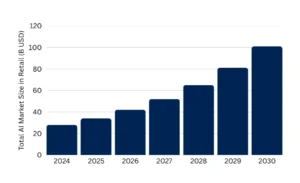The artificial intelligence technology has taken the world by storm. Especially since the introduction of generative AI and predictive AI, the world has started recognizing these technologies as powerful business tools. AI is being adopted in many businesses across industries, and it empowers businesses to yield exponential profits. In this blog, we shall see the impact of artificial intelligence in retail industry, its use cases, benefits, and challenges in brief.
Modern Challenges in the Retail Industry
The modern-day retailers face a crucial transition as the consumer base they cater to is changing. They need to optimize their inventories, manage sales, create a seamless shopping experience online as well as in-store, and meet rising customer demands. With modern-age customers demanding personalization and convenience, traditional systems fall short and often fail to provide appropriate solutions. Artificial intelligence offers numerous features that can help retailers create a seamless ecosystem that effectively caters to rising customer demands. Many businesses are already using AI in retail industry for several reasons. Let us begin to understand how AI helps retailers provide better services to their customers.
Use Cases of AI in Retail Industry
AI helps retailers optimize their processes and handles a wide range of tasks more efficiently than traditional tools or manual work. Automating some of the repetitive tasks also frees up human labor for innovation and strategic tasks. Let us see some popular use cases of AI in retail industry to understand the scope of AI in your retail business.
-
More Customer Engagement
AI-powered tools like chatbots and virtual assistants are capable of personalized communications, driving more customer engagement. From resolving queries and providing product recommendations to guiding customers throughout their purchase journey, such AI tools enhance the overall shopping experience. While a lot of competitors offer immersive shopping experiences, other retailers also need to cope with the demand and offer personalized interactions across different channels.
-
Smart Inventory Management
AI utilizes predictive analytics to estimate demands, thus allowing retailers to maintain necessary inventory levels. It can analyze sales data, market trends, and customer behavior to predict what products will be in demand. Once you can predict the market, you can easily avoid overstocking or stockouts by maintaining inventory accordingly. It can also help optimize logistic networks that are adaptable and more efficient.
-
Increase in Profit Margin
Leveraging AI algorithms for pricing helps adjust prices based on product demand, competition, and market conditions. With effective and strategic plans, real-time promotions, and dynamic pricing, you can easily optimize profit margins. Thus, it enhances business revenue without much effort. AI increases revenue by almost 10% by using techniques like cross-selling and upselling. This increase is also led by personalized product recommendations. When your customer sees only what they are looking for, then the chances of conversion also increase. Gartner predicts that by 2028, 25% of total KPI reporting will be generated by generative AI tools.
-
Customer Support Automation
Around half of global businesses are planning to invest in AI, only for the sake of customer service with chatbots. The reason is that AI-powered chatbots provide instant and 24/7 customer support. Such chatbots can handle routine inquiries for you, and thus human representative can focus on other complex tasks.
-
Discover New Product Lines
Artificial intelligence in retail industry can also be used for new product discovery. It analyzes customer trends and market data, which helps understand customer preferences. Thus, one can identify market gaps and develop new products that meet customer requirements. AI allows retailers to stay updated with trends, lead the way, and also innovate proactively.
-
Accurate Sales Forecasting
AI tools are capable of analyzing past sales data and predicting future sales, considering market trends. Thus, business owners can make data-based decisions about stock levels and marketing strategies. This happens due to data analytics and predictive analytics. Businesses that are not yet ready for full-fledged AI adoption can still use data analytics services from a trusted service provider.
-
Customer Sentiment Analysis
Another important use case of artificial intelligence in retail industry is in sentiment analysis. AI can now read and understand customer emotions through reviews, comments, and e-mails. This happens utilizing natural language processing (NLP). Using this capability of AI in your business, you can gauge customer opinion about your brand and products. This will help optimize marketing campaigns, take corrective measures, and improve overall business strategies.
-
Proactive Operations Maintenance
AI helps minimize maintenance efforts by predicting probable future breakdowns. Thus, AI also reduces downtime and helps you avoid any breakdown moments by acting proactively.

AI in Retail Industry-Use Cases Across Departments
AI in general boosts productivity and profits in retail industry. But it is important to understand how it can be used across different departments in the same business. A clear idea helps business owners to make better-informed decisions on AI implementation in the organization.
-
Merchandising
AI brings transformation in the merchandising department by redefining product selection and inventory management. AI-powered demand forecasting driven by historical sales data and real-time factors accurately predicts trends and customer preferences. This allows retailers to optimize product assortments and reduce the risk of overstocking or stockouts. Apart from this, dynamic pricing algorithms adapt prices in real-time, in response to market conditions, competition, and demand to ensure the best price strategies. With AI, merchandisers can tailor their products for the best offers and pricing, ensuring better sales and profitability.
-
Store Operations Management
When it comes to store operations, AI offers an efficiency boost. AI-driven inventory management systems supervise stock levels, helping to automate restocking processes and reduce stockout situations. AI also allows energy efficiency through optimized lighting, heating, and cooling in real-time. Thus, it reduces operational costs and saves energy. AI-driven maintenance also allows a proactive approach towards asset repairs and servicing, etc. Thus, cutting the downtime and streamlining the operations.
-
Production Management
AI enhances product quality and production efficiency through its miraculous features. An AI-powered computer vision system uses CNNs (convolutional neural networks), inspect products for any defects, reducing wastage and ensuring quality. AI-driven predictive maintenance also helps reduce production downtime. It also optimizes resource allocation, production schedules, and workflow to improve the efficiency of overall production.
-
Inventory and Supply Chain
Retailers often face issues regarding maintaining an optimal level of inventory. It becomes challenging to do so because of changing customer demands and market trends. However, predictive AI in retail industry helps understand changing consumer behavior and market trends in real-time to prepare inventory accordingly. This way, there is never stockout or overstock condition. Artificial intelligence in retail industry is a blessing also because it can optimize and manage even the supply chain very well. With its advanced technologies like machine learning and deep learning, it provides real-time visibility into the supply chain ecosystem. AI-driven route optimization through genetic algorithms and reinforcement learning reduces transportation costs and delivery times. Inventory and supply chain management is the most complex task of retail industry and can be easily handled through AI implementation.
-
Logistics
In the retail logistics department, AI offers efficiency and cost savings through innovative techniques and algorithms. AI-driven predictive maintenance uses machine learning algorithms to supervise the condition of vehicles and equipment. Thus reducing unplanned downtime and ensuring timely operations. Real-time tracking and monitoring by AI facilitates visibility into the movements of products and assets. AI-powered risk management can detect potential threats in the supply chain, like delay or interruption, thus allowing proactive risk mitigation opportunities.
-
Marketing and Advertising
AI has one of the most interesting and powerful impacts on marketing departments. It utilizes natural language processing and machine learning solutions to analyze customer data, social media sentiment, and historical performances of campaigns. This data allows AI to create a personalized and effective marketing strategy that speaks to individual customer preferences. AI also optimizes ad placement and bidding strategy on time, using specific algorithms and maximizing the ROI of marketing campaigns. When it comes to marketing content, AI’s super-trending innovation, generative AI, resolves the matter. Generative AI in marketing is mainly used for content creation for marketing material and customer segmentation.
-
Finance and Accounting
AI is crucial for reducing errors, improving financial decision-making, and streamlining processes in the finance and accounting departments. AI automates tasks like data entry, invoice processing, reconciliation, etc, with efficiency and accuracy. Machine learning algorithms analyze data to identify patterns and anomalies. This helps in fraud detection and risk management. Predictive analytical feature of AI in retail industry helps forecast trends and optimize budget allocation. AI helps in expense tracking, budget management, and financial reporting, offering insights for improvement.
-
Loss Prevention and Security
One of the top-priority tasks in retail remains with the loss prevention and security department. They focus on preventing theft and security breaches. AI-powered video analytics use object detection and facial recognition to analyze surveillance footage in real-time. This helps detect dangerous activities.
-
Human Resources (HR)
Artificial intelligence helps streamline recruitment by resume screening and using predictive analysis to select the best candidates. AI-powered chatbots help in answering employee queries and facilitating onboarding processes. Apart from this, AI can also manage the workforce, analyze employee performance, and address upcoming HR issues effectively.
-
Customer Service Department
AI enhances customer service through AI-powered virtual assistants and chatbots. These chatbots provide prompt responses immediately and are active 24/7. This allows instant query resolution, engaging more customers. It also allows human representatives to focus on more complex and strategic work as AI automates routine queries well.
-
E-commerce Operations
AI can be used for enhancing user experience on e-commerce platforms through custom recommendations, chatbots for quick customer interactions, and automated systems for efficient order management. Artificial intelligence in retail industry also helps in fraud detection by analyzing customer behavior. Moreover, AI unifies customer data from online and offline store purchases to create a seamless experience through every channel.
-
Procurement
An optimized procurement process includes data analysis to detect the best suppliers, negotiation of optimal terms, and streamlining the purchase process. AI can also predict the time when new stock will be required and thus automate ordering processes. It ensures a consistent and efficient procurement process.
-
Research and Development (R&D)
AI can assist the research and development department by providing market insights, trends, customer preferences, competitive products, etc, to help them develop new products accordingly. It also frees up human staff to think of innovation while handling routine tasks. Thus, it directly as well as indirectly supports innovation teams.
-
Store Development
For those retail businesses that own a physical store, AI can help analyze geographical and demographic data to understand the best spots for new stores. It can also predict which areas grow and which decline, thus empowering business owners to create a strategic store development.
Benefits of AI in Retail Industry
We have already seen how AI helps each department in a retail business boost their efficiency and reduce maintenance time and frequency. We shall still see in brief, wrap up the benefits of AI in retail industry. Mainly, the benefits are
- Personalization
- Enhanced Customer Service
- Increased Efficiency
- Better pricing and promotions
- Fraud detection and prevention
- Better customer experience
- Data-Driven decisions
Conclusion
Artificial intelligence in retail industry is a blessing for every retailer. Be it a small shop around the corner, ready to scale, or a huge e-commerce chain, AI can help your business grow from every stage. Book a demo with AnavClouds Analytics.ai for a detailed understanding of AI in your organization. Make sure to know what you implement, and take a futuristic and strategic approach towards AI adoption in your workflow. Connect with an expert AI development company and build tools that suit your requirements. With a trusted AI development service provider, you can not only transform your retail business but also generate multifold revenue. Get future-ready with us.
FAQs
How does AI affect retailing?
There are various ways in which AI affects the retail industry; however, the gist of all the impacts is that AI improves the overall efficiency of retail processes.
What is responsible AI in retail?
Responsible AI in retail refers to a compliance requirement that ensures that business owners use AI in retail responsibly and with ethical consideration. Thereby, maintaining trust and delivering value to the customers.
What are the risks for retailers when adopting artificial intelligence?
The major risk identified by retailers with the use of artificial intelligence is regarding customer data. Customers might be concerned about sharing their data as it might be subject to theft or breaches.
How does artificial intelligence in retail enhance customer experience?
Artificial intelligence in the retail industry is known for providing better customer support, personalized recommendations, and seamless omnichannel user experiences. This enhances the customer experience.
What is the biggest risk of using AI?
The biggest risk of using AI is bias. AI works on data, and if the data available for its training is inadequate or biased, the desired results will not be achieved or may result in skewed outputs.



